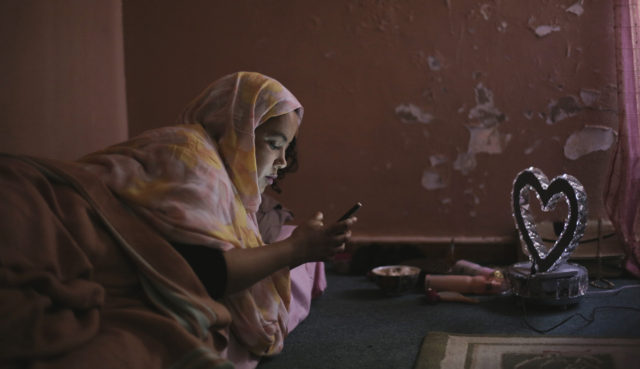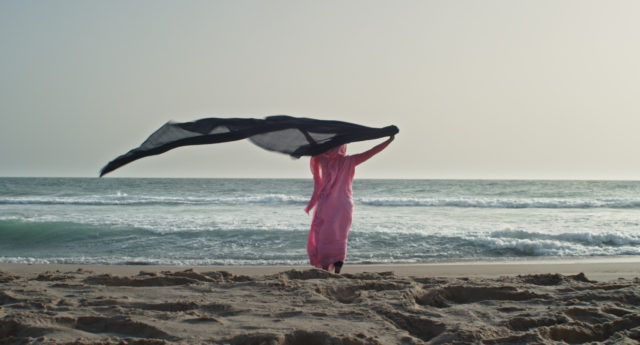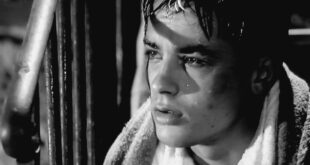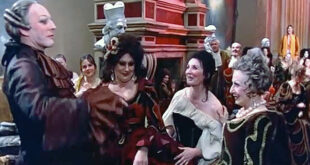Michela Occhipinti’s “Flesh Out,” which is in the International Narrative Competition of the 2019 Tribeca Film Festival, will take you into a world filled with emotion. Watching this film, you will feel disbelief, anger and sadness but if you look deeply, you’ll realize how similar the characters’ struggles are to your own.
Gavage is a centuries old tradition practiced in the West African country of Mauritania in which a young woman prepares for marriage by gaining a considerable amount of weight. The weight gain is symbolic of good health and prosperity. However, in 2019, many young people are not embracing this facet of their heritage.
Verida (Verida Beitta Ahmed Deiche) is one of those people. Engaged to a man she’s never met, Verida is forced by her mother day in and day out to eat heaping bowls of food and milk, 10 servings a day to be exact. When you look beyond the emotional trauma and consider the physical, long term damage that 10 meals a day consisting of meat and milk is doing to her body, it can be viewed as a form of abuse but instead of physical or verbal, it is portrayed by the exaggerated sounds of Varida chewing, slurping and swallowing and the mere annoyance of her mothering placing the bowls in front of her, and the noises of flies zipping around, landing on the bowls and on her.
Whether it’s the local butcher, her girlfriends, her grandmother or the young man who secretly loves her, everywhere Varida goes, people want to talk about her gavage- how it’s coming along, why she is doing it, how it’s affecting her emotionally, if it is still relevant, what it means to her family. Her entire world is consumed by something she detests. So not only is it taking her body from her but it is also taking her identity.
This is a film that really speaks to the tragedy of life. Everyone in this film is suffering in some way, not just Varida. Her father along with other locals leave their homes and pile into the back of a pickup truck heading to the mountains to search for gold to bring in money. In several scenes, there are animals tied up or walking aimlessly among the people. It’s just a matter of time until they meet their fates and end up in one of Varida’s bowls. Sidi, a young man who provides the scale for Varida’s weekly weigh-ins, is suffering because he is secretly in love with her and is forced to watch her suffer as she cringes at the weight she’s gaining and sometimes wears extra jewelry to tip the scale. Her mother’s spirit is clearly beaten and beyond repair and this makes for an unhappy home. The home is darkly lit with the only light filtering through draped windows. Varida is miserable at home. The only time she smiles is when she is with her sister. But even then, when she imagines the same path for her beloved little sister, she becomes sad.
The moments of joy for these people are few and far between but that’s what makes those moments more beautiful and as viewers, reminds us to savor them. The simple pleasure of enjoying a cup of tea, standing next to the person you love and looking down upon your city, the intimacy of friendship, the closeness to a sibling… Despite all the pain that we have to go through in life, these are the moments we cherish and it’s a universal message. Whether you’re from West Africa, Europe or North America, the situations may be different but the challenges are always present and the rewards are the same.
The film is not heavy on dialogue and there are numerous scenes in which the characters’ eyes and expressions do the talking. Occhipinti’s direction is reflected in the lead character’s performance- subtle yet strong. There are long silences and slow pans, which create an atmosphere of tension and quiet conflict.
The creative choices made by Occhipinti’s crew enhance the compelling performances and fascinating story. Her editor, Cristiano Travaglioli, is no stranger to American audiences. He worked with Paolo Sorrentino on his Oscar winning film, The Great Beauty, his 2015 film Youth and more recently, Loro. Travaglioli also edited Pif’s The Mafia Only Kills in the Summer, Francesco Munzi’s Black Souls and Antonio Piazza and Fabio Grassadonia’s Sicilian Ghost Story. Combined with Alex Braga’s soundtrack and Daria D’Antonio’s cinematography, the excellence achieved in this film makes it hard to believe that it’s Occhipinti’s first feature.
I talked with her about her inspiration behind telling this story, how she found her lead actress and her collaboration with one of Italy’s most sought after editors.
What drew you to this subject?
The idea was born in 2011. I was noticing that I was getting old through my lines. It was the first visual sign that most of my life had gone by. Then I thought, why does it bother me to have lines? I know that the life experiences that I live will leave traces in me, in my spirit. Why shouldn’t they leave them also on my body? I started making a broader reflection on women’s bodies in general and how much pressure is put on women’s bodies in every culture and I went through a few months when this was really a big issue for me. And then by chance, I bumped into a small article in an Italian magazine that talked about the Mauritanian women and gavage. It drew my attention immediately. At the very first second, I thought they are crazy but one second after, I said but we do the same thing. You are changing your body. Whatever shape you are trying to obtain doesn’t really matter. It’s really secondary. What’s really very similar even if the details are different is the process of obtaining that shape is the same lack of acceptance and lack of freedom.
The film opened in Europe (Berlin) and North American (New York) to very positive reviews. People are fascinated by it. When you set out to make this film, did you realize that the theme would be so universal?
Yes. I am interested only in universal subjects. I could maybe make a universal subject out of a local story in my city but it needs to be about discovery for me. It is work that takes so many years in completing, I need it to be a full life experience since I am so attracted to traveling and discovering new traditions and new ways of life, new scenery, new landscapes- both physical and metaphysical. I don’t know if there is a reason. I think my opinion is a very personal one. It might not be agreed on but when I see something from a completely different perspective, it makes me make such an effort that it stays with me much more than when something is told on a subject that I know, that maybe strikes me a lot, but then I don’t think about it very shortly after. It might seem that I am lacking completely of humbleness and modesty but I am looking for universal themes. It depends on if I succeed in making them universal. That is something that only the audience could say.
Varida’s performance was very compelling, very subtle yet very strong. How did you choose her for the role?
I met Varida in 2012 during the last days of my first scouting that lasted one month. I went there to research the story, to understand what it was about and to look for girls. When I found her, I knew right away that she was the one because her eyes were so expressive. It was the same thing with the postman in my first film and when I found him, I knew it was him. It’s like an attraction. I don’t know how to explain it better.
Tell me about Varida.
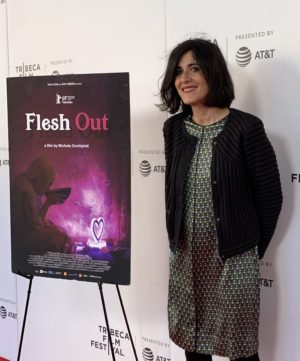
She is a young girl. At the time, she was doing some modeling for a billboard. That’s why I incorporated this into the story. She wants to be an actress but when I met her, she was very young and she was a bit wild. Then years went by because it took so much to find the financing and everything for the film. She divorced from her first husband. She found another husband. She went to live in Turkey so when I went back, she was gone and I was desperate. But then a few days later, she showed up at the casting because she had just by chance returned to live in Mauritania. I shot her in 2012 and 2015, but only her expressions. I was interested in her eyes mainly. Then in fact, a few days before shooting the actual film, I thought I am crazy. I never tried to let her act by saying words. But I did well I think because the first few times, she was a bit over the top but she followed so well because she lived that same story or similar to that when she was 16. She was promised a marriage to a man and she underwent gavage. In fact, in two scenes of the film, the strongest ones, the one when towards the end, she was touching the veil and started crying. She told me that she was thinking about the past. And also in the scene where she shouts to her mother and her mother gives her a smack on the face, we tried it a few times and it was ok and then we walked out of the house and talked for a half hour and told her that I knew it was very painful for her and I was sorry for asking but that she should dig into what she felt when it happened to her and that’s when it really came out. I think she’s a very intelligent girl. She understands every nuance. We shot the film mainly in sequence because I wanted her to get into her character and the first scenes were easier to shoot. But then she was also very clever. We were only an eight-person crew. We didn’t have makeup. We didn’t have costumes. We didn’t have design. We didn’t have anything. We did it all. And each one of us did much more than our job. Verida did her own makeup. We had some tests and told her how she should do it. Towards the end, she was so clever that she would pick it off a little, so there is also this transformation of her skin. We became really good friends.
What was her reaction to the film and how well it’s been received?
When we did the World Premiere in Berlin, I sat next to Verida the whole time and I was holding her hand. At the end of the screening, we were all called up to the stage. Verida talked and she said the film resembles 70 percent of her own life experience and she loved it. We were all very moved because we’ve been through a lot with this whole process of doing the film since 2012. It’s a long time.
How did you come to work with the editor Cristiano Travaglioli?
The producers, especially Marta Donzelli along with Gregorio Paonessa thought that Cristiano should edit my film. He is one who never misses a cut. Every cut he does has meaning. We met for lunch and I never thought that Cristiano would do my film because I am not a well-known director and the project was very risky. It was a very small production with a very low budget. But he did it, he accepted it and it was amazing to work with him because he’s got such good taste and also with Alex Braga who did the original music. But then there are two pieces of music that Cristiano chose and I that immediately loved. He likes exactly what I like but he’s got much more musical culture. So when I cannot explain exactly what I want, he has the words to translate, which is amazing. Also, aside from the editing and all that, he’s got some amazing ideas and I was so blessed to work with him.
Well I think the relationship between an editor and director is very important to the success of a film.
Yes and we wrote and rewrote bits of the film during the editing. We changed a lot of things during editing. We were so few people that I had to think about so many things and sometimes I was not focused enough. For example, I would focus a lot on the direction of the actors and I had to think about all the costume changes. We were just eight, so it was complicated. I like his mind. I like the way he thinks. He is amazing. I was really lucky.
There were two scenes that stood out for me. In the beginning, when the men were leaving for the mountains, she was watching them through the bars on the house window. It gave me the impression that she was imprisoned. Was that a conscious decision?
I didn’t really think about that. The house where we shot, I found in 2016 when I was location scouting, casting and doing all these things. I loved that house because it was perfect. I was also looking for some bars in front of the windows. I didn’t know exactly why. I just wanted them and I imagine that unconsciously it was for something like that. I wanted a house that had a terrace because I wanted the character to be going up because going up is like elevating yourself literally and while writing, we thought that it was a perfect thing because everyone is always looking at how she’s improving with this gavage. At least that’s like her little haven. She just can observe the world without being observed. Yes it is.. It’s like a girl locked in a tower.
The next screening of “Flesh Out” during the Tribeca Film Festival will take place on Saturday, May 4 at 11:30 AM at the Village East Cinema. Click here http://www.tribecafilm.com/filmguide/flesh-out-2019 to purchase tickets.
 Fra Noi Embrace Your Inner Italian
Fra Noi Embrace Your Inner Italian


